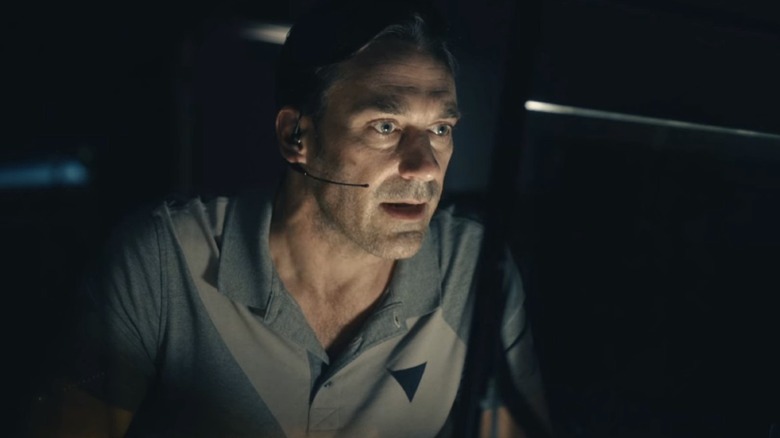
No modern show makes you question your entire existence like "Black Mirror." Utilizing advanced technology ranging from neural implants to social metrics, the show, created by Charlie Booker, tells honest stories mostly about the destruction of humanity. Hopeful and light episodes are few and far between, but audiences nevertheless plug into its swirling cynicism and nihilism. Despite the real world not being much better, "Black Mirror" offers an escape and a chance to live vicariously through beloved characters and find comfort in the safety of our homes.
Season 6 is finally coming down the pipeline, and that means it is a perfect time to revisit the show and its most frightening episodes. Whether it is a device that records every memory or a contraption that houses your cloned consciousness or maybe a world ruled by a social ranking, the technology itself always sends chills down our spines. Add in multi-layered characters and rich, complex stories, and you have a recipe for some of the best storytelling around. Below, we rank the show's 13 scariest episodes to date and how they relate to real life. Buckle up. It's a roller coaster.
The Entire History Of You
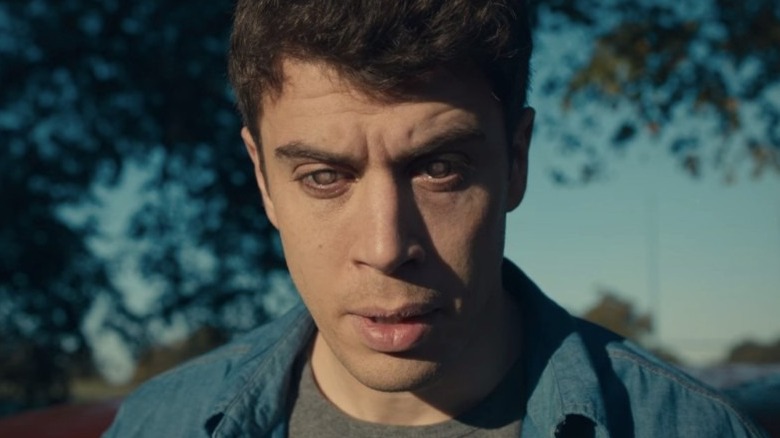
The show's first season ends with a focus on memory and the self-inflicted torture that occurs when the past is replayed over and over again. "The Entire History of You" sees director Brian Welsh taking a literal approach through the use of technology that records one's every waking moment. When you want to rewind a memory, you simply pick up a remote and scroll back through a visual catalog.
Toby Kebbell plays a lawyer named Liam, whom we first meet during a performance appraisal at a law firm. The meeting does not go well. Liam frets over the interaction and replays the moment, trying to decipher the conversation. He later meets up with his wife, Ffion (Jodie Whittaker), at a dinner party with friends, and he can't move on from talking about the meeting.
Through a series of social cues, Liam suspects Ffion may have had a previous sexual encounter with party host Jonas (Tom Cullen). Ffion and Jonas shamelessly flirt but shrug it off simply as good friends catching up. Jonas tumbles down a rabbit hole of contempt and paranoia over Ffion's romantic past and eventually forces her to sift through her own memories. The implications are dire for those with any sort of mental illness. This sort of technology (which could one day be a reality) could drastically affect mental health and recovery. Hard pass.
Nosedive
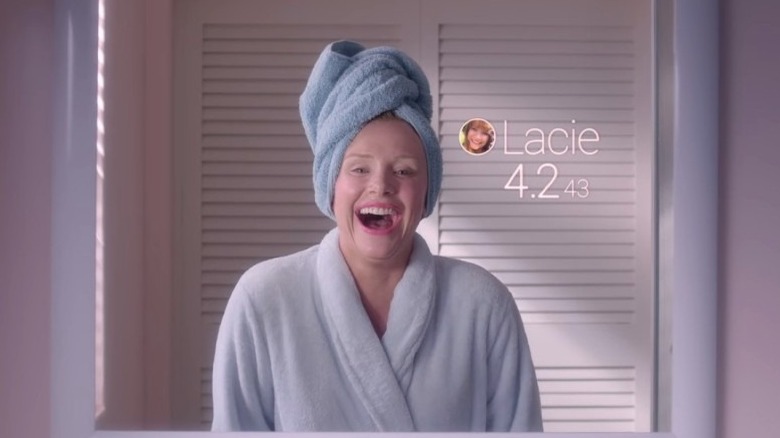
The Season 3 premiere episode "Nosedive" is reality as we already know it. In a world where real-life encounters culminate in a socioeconomic score that affects every aspect of your life (housing, jobs, airplane seating, etc.), a young woman named Lacie (Bryce Dallas Howard) anguishes over her 4.2 rating and plots to raise it to a 4.5.
On a whim, Lacie posts a snapshot of Mr. Rags, a sentimental rag-doll from her childhood. She plans to lure in an old friend named Naomi (Alice Eve), who has a 4.8 rating. Engagement with her could mean a bump in her own score. The long-lost friends rekindle their friendship, and Naomi invites Lacie to her upcoming wedding. Lacie can't possibly say no. This is her chance. Being surrounded by nothing but 4.5-rated people and higher could prove monumental to her upward trajectory.
Directed by Joe Wright, "Nosedive" is a twisted marriage between social media and the classist, capitalist system which currently exists. Whether we're aware of it or not, most of us turn to our phones for connection and validation. Imagine if the social media game directly impacted your ability to get a job or buy a car. As we speak, China is testing such a system on a voluntary basis but plans to mandate the social credit system nationwide. Better work on that follower count.
White Christmas
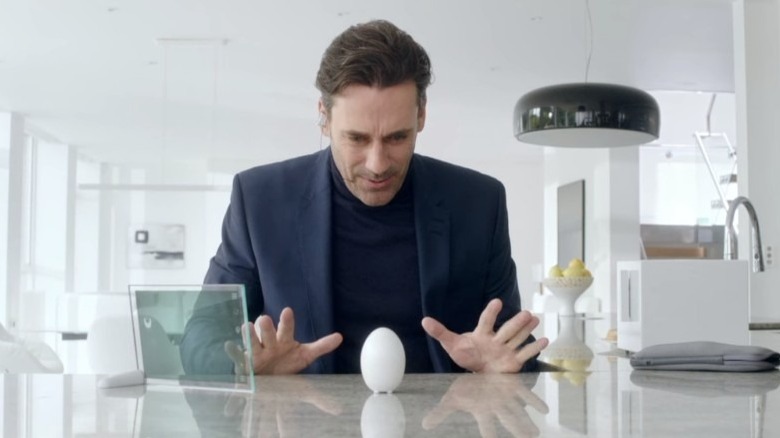
Jon Hamm stars in the holiday-themed "White Christmas," a special holiday installment released between Seasons 2 and 3. A mini-anthology, the episode (directed by Carl Tibbetts) follows Joe Potter (Rafe Spall) who awakens in a snow-capped cabin and meets a man named Matt Trent (Jon Hamm).
They've been living together for five years but have rarely spoken. With seemingly good intentions, Matt shares how he came to live in the cabin, detailing a story about Z-Eyes, a technology that allows one's vision and hearing to be transmitted offsite. Matt had previously run a dating service and helped awkward, unsociable men get dates and flirt. A bizarre turn of events leads to the death of a client, and the rest is history. Living in the cabin is his punishment.
The second story revolves around Matt's day job training "cookies," carbon copies of a person's consciousness used as live-in servants. Through these tales, Joe decides to open up about his past and reveals the tragic end of his former relationship as well as the guilt that weighs on his shoulders from killing a man. The "cookies" tech comes back around to deliver a wallop in the third act. The mere suggestion that our consciousness could be cloned and used for mundane (or possibly dangerous) tasks is unsettling, to say the least.
Shut Up And Dance
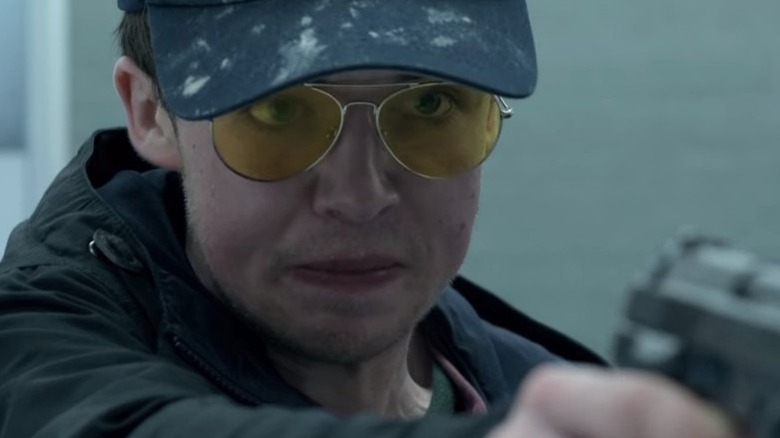
Director James Watkins turns up the heat on hacker culture as well as the adverse effects of hiding behind anonymity online in "Shut Up and Dance." Alex Lawther portrays restaurant worker Kenny. He's your typical, hard-working blue-collar guy, and all he wants is a little alone time when he gets home. Having swiped his laptop, his sister unwittingly downloads malware which makes it vulnerable to a hacker attack.
While pleasuring himself in his bedroom, Kenny becomes the latest target of an unknown hacker hellbent on teaching strangers on the internet hard lessons. The hacker records this intimate moment and threatens to leak the clip to everyone in his email contact list. He gives Kenny an out: If he can follow text instructions and meet at the rendezvous point, nothing will come of it.
To say "Shut Up and Dance" is one of the darkest of the series is an understatement. With plenty of online users being doxxed and blackmailed for various reasons, the idea that a group like Anonymous could destroy lives with a few keystrokes is a nightmare.
Playtest
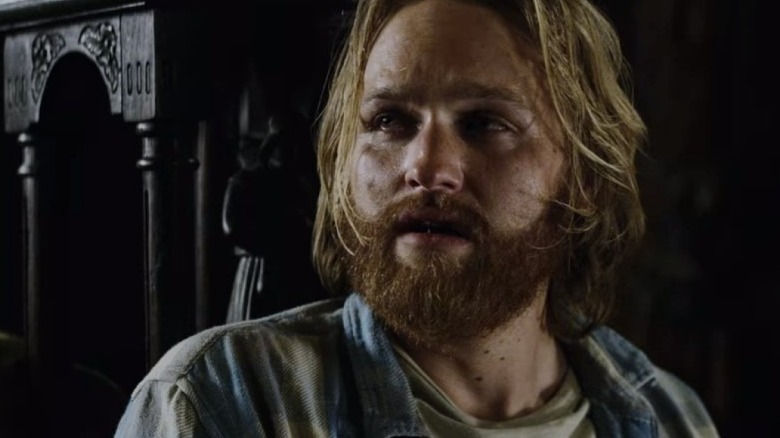
Horror video games are terrifying enough on their own and could get even scarier. In "Playtest," director Dan Trachtenberg conjures up a haunting scenario in which gamers are given an immersive experience based on their very real deep-seated fears. The technology feeds on nightmares and the things we're most afraid of and never speak about.
Strapped for cash and stranded in London on vacation, Cooper (Wyatt Russell) signs up to test out a brand new interactive video game. On location, he has a "mushroom" implanted into the back of his neck, and it begins controlling sensory receptors, mostly visual and auditory. He first plays a game of Whac-a-Mole before being enlisted for a more advanced experience. Cooper is then transported to a creepy mansion straight out of an Edgar Allan Poe story.
Once there, he undergoes a test of psychological will and faces all his fears, from spiders to Alzheimer's Disease (from which his father died). His world unravels, and he is unable to stop what's coming next. "Playtest" is among the show's most uncomfortable episodes and speaks to far more universal fears such as illness, death, and the afterlife. It's a doozy.
Men Against Fire
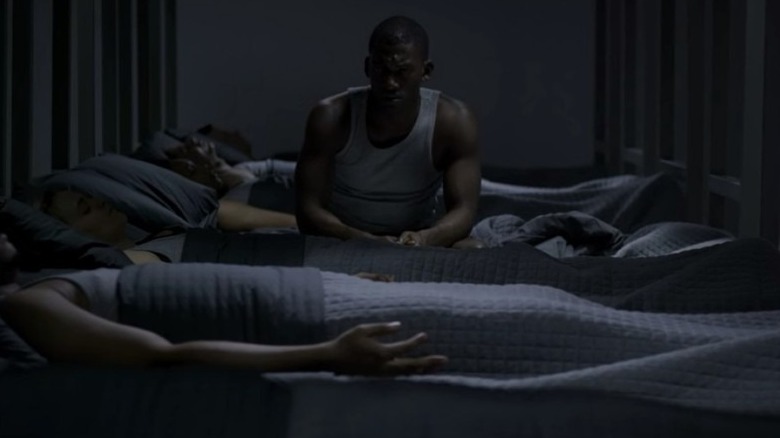
In "Men Against Fire," the penultimate episode of Season 3, director Jakob Verbruggen explores the politicization of combat and blind loyalty as it pertains to war and the military. "Stripe" Koinange (Malachi Kirby) enlists in the army and is tasked with snuffing out "roaches," humanoid creatures that inhabit small villages. A neural implant, dubbed MASS, supplies soldiers with crucial data as well as an augmented reality filter.
A new mission requires Stripe and his comrades to destroy a secluded cabin that allegedly houses a swarm of roaches. Everything goes off without a hitch, and he is awarded an erotic dream for his heroic efforts. During the dream, his MASS implant glitches, but a visit with a psychologist reveals no further damage. The next day, it continues to falter during a new mission, and the augmented reality mask slips. Stripe sees the so-called roaches for who they are — human beings just trying to survive.
"Men Against Fire" unapologetically confronts militarized brainwashing and the demonization of the poor in third-world countries. Verbruggen gives the story nuance and care, peeling back the outer layer of life in the real world.
White Bear
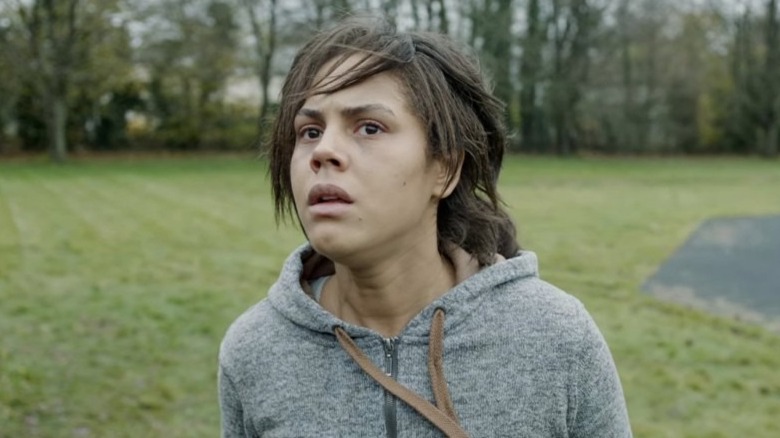
"White Bear" might be the most difficult episode to swallow. Based on the prison system, this episode, directed by Carl Tibbetts, depicts a world in which criminals are sentenced to an immersive experience to give them a taste of their own medicine.
Lenora Crichlow plays a woman named Victoria Skillane who is convicted for the abduction and murder of a young girl. She first awakens tied to a chair in a random apartment building, the TV set blasting static and a cryptic symbol. After breaking free, she has no recollection of her identity or where she is. She implores others to tell her what's going on, but all they do is record her on their phones. Masked killers soon arrive, and she is hunted down.
Victoria's entire memory has been wiped, and she is forced to live this day over and over again. She eventually learns the truth (as she does every single day) and confronts what a monster she was in a past life. The issue with the episode's premise is the moral duty to hold others accountable without becoming just another monster. If Victoria can't remember her crimes, does she deserve such a heinous punishment?
Fifteen Million Merits
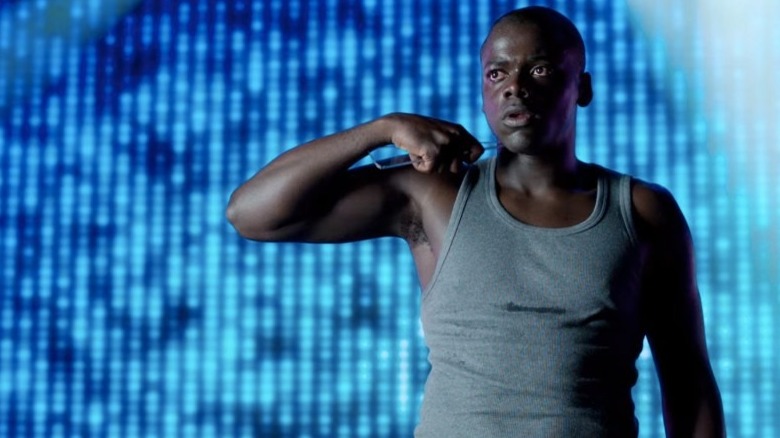
In "Fifteen Million Merits," director Euros Lyn weaves through a futuristic world where people effectively stripped of individuality live and work inside a screen-equipped building, their lives relegated to serving the greater good. Ambition and creativity only shine through climbing higher on the proverbial ladder.
Before his breakout role in "Get Out," Daniel Kaluuya starred in this episode as Bing. Bing keeps his head down and tries to do his best in the world. He strikes up a flirtatious friendship with Abi (Jessica Brown Findlay), who dreams of becoming a famous singer. Throughout the facility, a competition show (think "America's Got Talent") plays every single night. The possibility of fame and fortune flashes brightly in Abi's eyes, but auditioning for the show requires a hefty sum of merits (15 million to be exact).
To impress her, and to make her dreams come true, Bing works overtime to raise the merits for her golden ticket. It's a sweet gesture, but it doesn't go the way either Abi or Bing anticipate. As they both discover, it furthers the exploitative nature of their existence. It's not worth it, and in the end, "Fifteen Million Merits" underscores the notion that the capitalist system is terrible but we all play the game anyway. We have to survive somehow.
Be Right Back
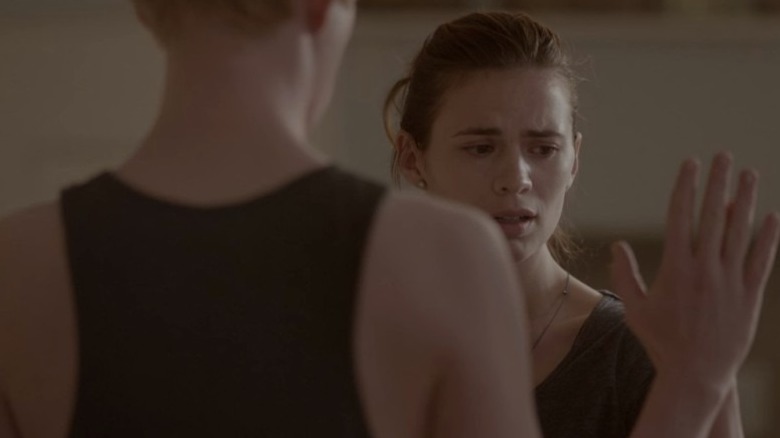
Amazon recently announced plans to give its virtual assistant Alexa access to dead loved ones' voices. That's basically "Be Right Back," and it's downright chilling. In the Season 2 premiere episode, director Owen Harris posits that such technology would cause irreparable damage to society and the grief process. Using this tech could create a delusional version of reality.
Martha (Hayley Atwell) suffers an unimaginable tragedy when her husband, Ash (Domhnall Gleeson), dies in a car accident. A friend suggests a burgeoning new gadget that allows a grieving person to reconnect with their deceased loved one. The technology combs a dead person's social media, emails, and all other public posts as well as audio-video clips to create a vocal likeness. Then, it engages in conversations with responses based on all submitted content.
Martha is at first skeptical, but in her grief, she decides to try it out. On one hand, it might allow the grief-stricken to say goodbye, yet it could open a can of worms in obsessing over the past. The automated Ash hints that there is a next level to the experience, and Martha orders a physical recreation of Ash. Unsurprisingly, Martha disassociates herself from friends and family. She emotionally unravels and realizes that the Ash clone is causing her more harm than good. "Be Right Back" is the show's most emotionally-charged and immensely-profound episode.
Hated In The Nation
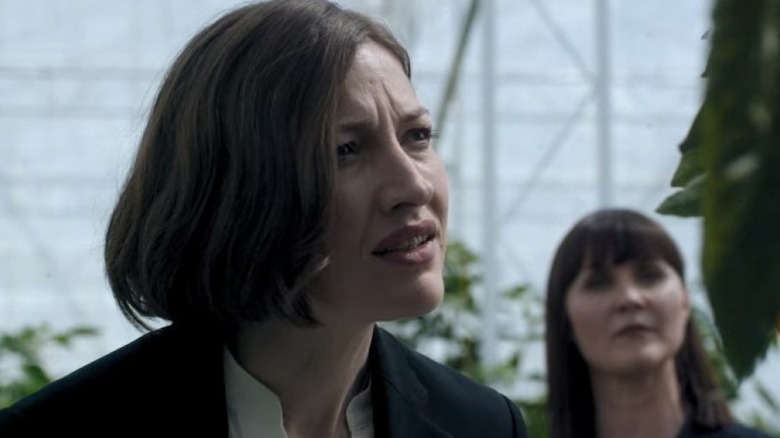
So many social movements are reduced to hashtags and Twitter trends. "Hated in the Nation" takes this idea and distills it down to 90 minutes. Director James Hawes analyzes intense online vitriol, doxxing, death threats, and the very horrifying possibility we are much closer to this reality than we think. When it comes to holding those in power accountable, it is a dangerous tool in the wrong hands.
Detective Chief Inspector Karin Parke (Kelly Macdonald) investigates a series of mysterious deaths all linked back to a "#DeathTo" hashtag. Some of these deaths, such as that of a woman slitting her own throat with a broken wine bottle and a rapper dying inside an MRI machine, don't make much sense and seem to indicate a much larger, more sinister force at work. From insulting a young fan to lampooning an editorial piece, the targets come under attack on social media for their words and actions, regardless of intention. It's the impact that matters.
"Hated in the Nation" also includes an ADI technology used by the government to spy on civilians. It's a packed episode, yet it never feels overwrought or bloated. If society keeps following the downward trail of social media, this could be our future.
Black Museum
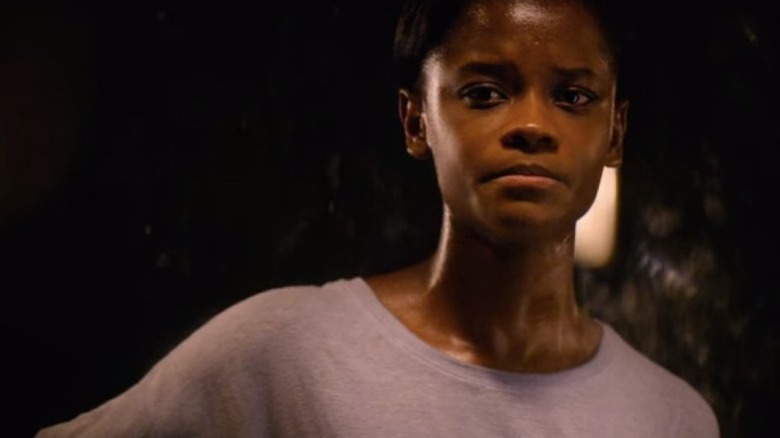
Another mini-anthology episode, "Black Museum" (directed by Colm McCarthy) centers on a roadside museum. Within its walls, Rolo Haynes (Douglas Hodge) shares various crime-scene artifacts, including many from previous episodes. Rolo is nothing if not a showman when it comes to storytelling. When a young woman named Nish (Letitia Wright) pops in for a visit, he gives her a grand tour and shares a few stories.
First up is a dark tale about a hairnet device used for medical research. When worn, it gives the wearer the ability to feel what a patient feels and thus expedites the diagnosis process. A once-heralded doctor falls from grace and uses the technology to mine his erotic thrills from pain. The next story follows a man whose wife is hit by an oncoming van and to save her, he seeks out Rolo to implant her consciousness inside his head (and later a stuffed monkey).
The most powerful tale comes in the finale, the conclusion to the wraparound story. Rolo's prized exhibit involves a Black man named Clayton Leigh (Babs Olusanmokun), who was falsely accused of murder and has his consciousness duplicated into a hologram. His hologram self has since been imprisoned inside an execution chamber. Visitors pay to pull the lever to electrocute him, fulfilling their sadistic, racist desires. "Black Museum" is the show's most urgent and socially significant episode. Pop stars are already being replicated as holograms, so this alternate universe (i.e. a hologram you being punished after you're dead and gone) is inching over the horizon.
Smithereens
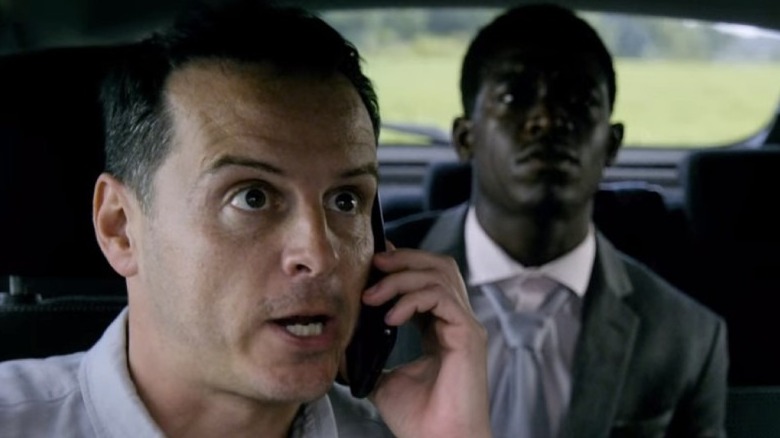
"Smithereens" is the episode most grounded in our current reality. Directed by James Hawes, it spotlights the drastic state in which we live through social media. In real life, scientists warn about the harm social networking sites like Facebook have on our wellbeing. "Smithereens" frames the conversation in a way that is truly eye-opening.
Rideshare driver Chris Gillhaney (Andrew Scott) circles around the headquarters of Smithereen, a social media company. Day in and day out, he picks up various workers out front with the hope of giving a lift to a Smithereen employee. Initially, his intentions are unclear, and when he picks up an intern named Jaden (Damson Idris), Chris takes him hostage and drives to a secluded cornfield. He demands to speak with Jaden's higher-ups and eventually is able to get Smithereen CEO Billy Bauer (Topher Grace) on the line.
Desperate and emotional, Chris just wants to talk and be heard. Billy gives him the chance to air his grievances. Chris shares a story about the tragic death of his wife, which he caused when he checked his phone for notifications. He blames the social media company for making the app inherently addicting, suggesting that social media really is causing great harm. When things end in catastrophe, a mass alert is sent out to everyone in the city. People merely glance at the notification, swipe it off, and go back to their lives. They're so numb, they don't even care. That's real life.
Metalhead
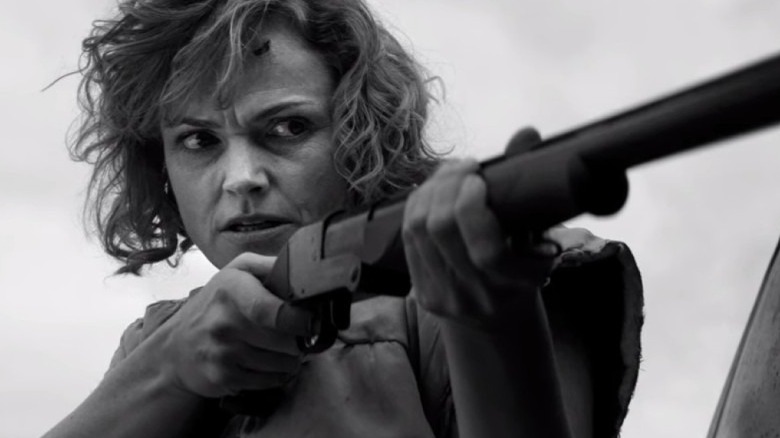
There are few post-apocalyptic stories that carry such subtle poetry. "Metalhead," directed by David Slade, is shot entirely in black and white. It's a creative choice that makes the story, visuals, and performances feel even colder and eerier. Set decades in the future, the world is an absolute wasteland, and humans are hunted by robots. Literally, robot dogs will one day rule the earth.
Maxine Peake plays Bella, a tough-hearted woman scavenging in the wilderness. Accompaned by a few friends, Peake's mission is to locate and infiltrate an abandoned warehouse and locate a special box. Every step of the way, a pack of robot dogs is hot on her trail. The mechanical beasts are equipped with AI and the ability to spray shrapnel embedded with tracking devices. Any mission to the outside world is a life and death endeavor, and it better be worth it.
"Metalhead" is a quiet, humanistic story about Bella's survival. With the exponential growth of technology as well as such inventions as Sophia the Robot, we may as well pack it in as the human race. The end of the world won't be a zombie plague, it'll be brought about by technology we created to make life easier. So much for that.
Read this next: The 14 Best Sci-Fi Shows On Amazon Prime
The post The Scariest Black Mirror Episodes Ranked appeared first on /Film.
